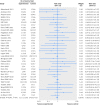Effects of weight loss interventions for adults who are obese on mortality, cardiovascular disease, and cancer: systematic review and meta-analysis
- PMID: 29138133
- PMCID: PMC5682593
- DOI: 10.1136/bmj.j4849
Effects of weight loss interventions for adults who are obese on mortality, cardiovascular disease, and cancer: systematic review and meta-analysis
Abstract
Objective To assess whether weight loss interventions for adults with obesity affect all cause, cardiovascular, and cancer mortality, cardiovascular disease, cancer, and body weight.Design Systematic review and meta-analysis of randomised controlled trials (RCTs) using random effects, estimating risk ratios, and mean differences. Heterogeneity investigated using Cochran's Q and I2 statistics. Quality of evidence assessed by GRADE criteria.Data sources Medline, Embase, the Cochrane Central Register of Controlled Trials, and full texts in our trials' registry for data not evident in databases. Authors were contacted for unpublished data.Eligibility criteria for selecting studies RCTs of dietary interventions targeting weight loss, with or without exercise advice or programmes, for adults with obesity and follow-up ≥1 year.Results 54 RCTs with 30 206 participants were identified. All but one trial evaluated low fat, weight reducing diets. For the primary outcome, high quality evidence showed that weight loss interventions decrease all cause mortality (34 trials, 685 events; risk ratio 0.82, 95% confidence interval 0.71 to 0.95), with six fewer deaths per 1000 participants (95% confidence interval two to 10). For other primary outcomes moderate quality evidence showed an effect on cardiovascular mortality (eight trials, 134 events; risk ratio 0.93, 95% confidence interval 0.67 to 1.31), and very low quality evidence showed an effect on cancer mortality (eight trials, 34 events; risk ratio 0.58, 95% confidence interval 0.30 to 1.11). Twenty four trials (15 176 participants) reported high quality evidence on participants developing new cardiovascular events (1043 events; risk ratio 0.93, 95% confidence interval 0.83 to 1.04). Nineteen trials (6330 participants) provided very low quality evidence on participants developing new cancers (103 events; risk ratio 0.92, 95% confidence interval 0.63 to 1.36).Conclusions Weight reducing diets, usually low in fat and saturated fat, with or without exercise advice or programmes, may reduce premature all cause mortality in adults with obesity.Systematic review registration PROSPERO CRD42016033217.
Published by the BMJ Publishing Group Limited. For permission to use (where not already granted under a licence) please go to http://group.bmj.com/group/rights-licensing/permissions.
Conflict of interest statement
Competing interests: All authors have completed the ICMJE uniform disclosure form at www.icmje.org/coi_disclosure.pdf and declare: The Health Services Research Unit is funded by the Chief Scientist Office of the Scottish Government Health and Social Care Directorate. No author has financial relationships with any organisations that might have an interest in the submitted work in the previous three years.
Figures






References
-
- World Cancer Research Fund, American Institute for Cancer Research. Food, nutrition, physical activity, and the prevention of cancer: a global perspective. World Cancer Research Fund 2007;Second Expert Report.AICR, 2007.
-
- Guh DP, Zhang W, Bansback N, Amarsi Z, Birmingham CL, Anis AH. The incidence of co-morbidities related to obesity and overweight: a systematic review and meta-analysis. BMC Public Health 2009;9:88 10.1186/1471-2458-9-88 pmid:19320986. - DOI - PMC - PubMed
-
- Tuomilehto J, Lindström J, Eriksson JG, et al. Finnish Diabetes Prevention Study Group. Prevention of type 2 diabetes mellitus by changes in lifestyle among subjects with impaired glucose tolerance. N Engl J Med 2001;344:1343-50. 10.1056/NEJM200105033441801 pmid:11333990. - DOI - PubMed
-
- Diabetes Prevention Program Research Group. Reduction in the incidence of type 2 diabetes with lifestyle intervention or metformin. N Engl J Med 2002;346:393-403. 10.1056/NEJMoa012512 pmid:11832527. - DOI - PMC - PubMed
-
- Flegal KM, Kit BK, Orpana H, Graubard BI. Association of all-cause mortality with overweight and obesity using standard body mass index categories: a systematic review and meta-analysis. JAMA 2013;309:71-82. 10.1001/jama.2012.113905 pmid:23280227. - DOI - PMC - PubMed
Publication types
MeSH terms
Grants and funding
LinkOut - more resources
Full Text Sources
Other Literature Sources
Medical
